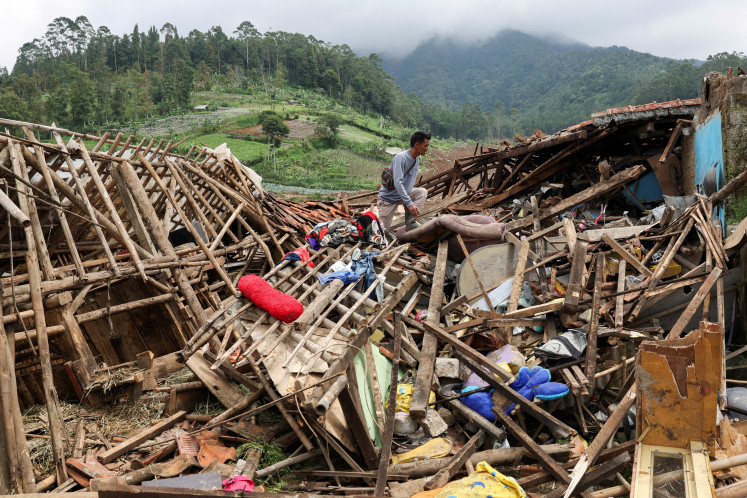Popular Reads
Top Results
Can't find what you're looking for?
View all search resultsPopular Reads
Top Results
Can't find what you're looking for?
View all search resultsJapan EPA affected by crisis
Part implementation of Japan’s EPA agreement with Indonesia to help develop human resources in 13 industries is delayed by the economic crisis
Change text size
Gift Premium Articles
to Anyone
Part implementation of Japan’s EPA agreement with Indonesia to help develop human resources in 13 industries is delayed by the economic crisis.
An expert assistant to Industry Minister Fahmi Idris, Achdiat Atmawinata, said Thursday that out of the 13 sectors programmed under the Manufacturing Industrial Development Center (Midec), part of the Indonesia-Japan EPA economic cooperation agreement, three of the components mentioned have not yet started to be implemented.
The Midec training program is a supporting part of the Indonesia-Japan Economic Partnership Agreement (IJ-EPA), a free trade agreement between the two countries which came into force last July.
“The ongoing economic crisis has hurt Japan’s economy and consequently affected the implementation of the Midec.”
“[Therefore] we set a target that the work for three remaining sectors – electronics, petrochemicals and food and beverages – would start in the fiscal year of 2009,” he added.
The 13 sectors include metal work, welding, industrial molds and dies, export promotion and investment, micro business, automotive, steel, textile, oleo chemicals and non-iron metals.
Indonesia could earn up to US$68 billion by 2012 from expanding businesses in the 13 areas, if they are well-developed under the Midec program, Achdiat said.
The IJ-EPA requires Japan to actively help develop the 13 sectors under the Midec program because this would also help determine “the level of Japan’s products absorbed in the Indonesian market”, he said.
Industry Minister Fahmi Idris said earlier that industrial capacity building under the Midec programs would experience a “little” disturbance as the global financial crisis is hitting the world’s developed economies, including Japan.
“Midec training and education related programs may be delayed [because of the crisis],” he said.
“But [the crisis] will not delay programs [related to efforts to intensify export-import activities between the two countries] by any means.”
“Even if there were a decline in the volume and value of our exports to Japan and vice versa, that would not result from any delay in [the implementation of] Midec programs.”
Under the IJ-EPA, Indonesia agrees to reduce to zero 92.5 percent of 11,163 tariff lines covering import duties on a wide range of items incrementally over a period of 15 years from the start of the agreement.
Indonesia has further scrapped 328 tariff lines imposed on steel products under the user specific duty free scheme (USDFS), which also comes under the IJ-EPA. This covers steel products used in automotive and auto parts, electronics, energy and construction.
Indonesia reciprocally accesses duty reductions for exports of fruit and fishery products to Japan.
The Economic Partnership Agreement is designed to strengthen bilateral economic relations between the two Asian nations, covering not only issues related to trade and tariffs but also investment and movement of labour.
Besides Indonesia, Japan has also signed EPA agreements with
Singapore, Mexico, Malaysia, Chile and Thailand.










